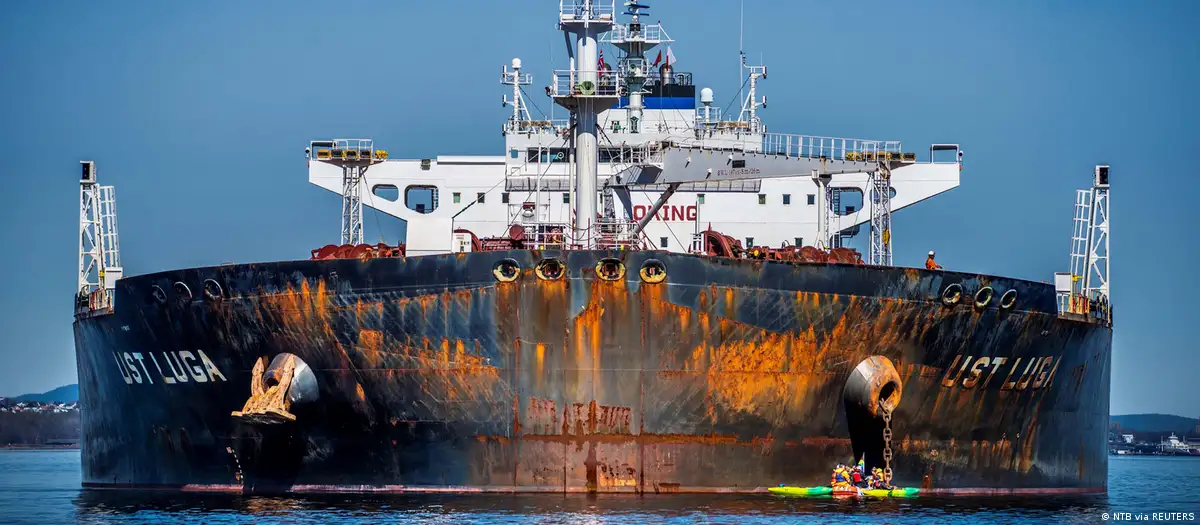Tehran has lived under an embargo for almost 40 years, and Moscow has never faced so many economic restrictions in such a short space of time as it does now. Despite this, the measures have had a limited effect.
(DW) Iran knows it, China knows it and, apparently, the United States knows it too: despite the sanctions currently in force against the Islamic republic’s oil industry, Tehran has been exporting record volumes of the commodity to Beijing.
Javier Blas, a columnist covering energy and trade in raw materials for the American news agency Bloomberg, explains how this happens: “If you believe what the Chinese government says, they are not importing any fuel from Iran. Zero. Not a single barrel. Instead, they’re buying unrefined [oil] in droves from Malaysia – so much so that, according to Chinese customs data, they’re somehow buying more than double what Malaysia actually produces.”
The resale of Iranian oil has made Malaysia the fourth largest supplier of the resource by 2023, behind Saudi Arabia, Russia and Iraq.
For many years, Iran has used the United Arab Emirates to evade sanctions. Dubai, one of the monarchy’s seven emirates, is the main entry point for banned goods that supply Tehran – except oil. The Islamic Republic has long since modified its supply chains to obtain almost anything embargoed by the United States or the European Union, through commercial and financial hubs like Dubai.
Central Asia is Russia’s new commercial hub
Due to Western sanctions resulting from the war in Ukraine, Russia has established similar trade routes to ensure the continuous supply of goods vital to its economy.
The former Soviet republics in Central Asia have proved ideal for circumventing the embargoes, as countries such as Kazakhstan and Kyrgyzstan are part of a customs union with Moscow. In addition, the vast distances – Kazakhstan alone shares a border of more than 7,500 kilometers with Russia – make it practically impossible to apply sanctions.
Thanks to Russia’s strategy of undermining sanctions, Armenia, for example, saw its imports of German cars and components increase by almost 1,000% in 2023.

Sanctions abound, but with timid effects
On paper, Russia is the most sanctioned country in the world, according to data from the Castellum.AI global database.
In practice, however, the Russian economy is far from collapse: it grew by a robust 3.6% in 2023, and Russian Finance Minister Anton Siluanov has stated that the rate for 2024 is expected to remain “at the same level”.
The prognosis is supported by the International Monetary Fund (IMF), which projects a 3.2% expansion in Russian GDP – partly due to high levels of public spending and investments related to the war in Ukraine, but also due to profits from oil exports.
In total, Russia faces more than 5,000 sanctions – more than the total imposed on Iran, Venezuela, Myanmar and Cuba combined. The targets of these embargoes are politicians and officials in Vladimir Putin’s government, as well as Russian oligarchs, large companies, financial institutions and the Kremlin’s military-industrial complex.
Financial sanctions have restricted Russian banks’ access to international financial markets, excluding them from the Swift payment system, used for most international transactions.
In addition, the Russian Central Bank had its reserves blocked in the G7 countries – the United States, Germany, France, the United Kingdom, Italy, Japan and Canada.
The point is that only sanctions imposed by the United Nations Security Council have legal force worldwide. In addition, several countries, such as India, China and Brazil – the latter of which recently rose to the position of the largest importer of Russian diesel – have not endorsed these embargoes.
A question of coherence
If this is the case, why do Western nations continue to issue sanctions that they are unable to enforce in practice?
“If there were no sanctions, it would be almost like tacit support. Or as if there were no reaction to this illegal attack [by Russia on Ukraine],” explains Christian von Soest, a sanctions expert at the German Institute for Global and Regional Studies (Giga).
The US and Europe need to calibrate their actions to “force Russia and Iran to change their behavior,” says the author of Sanctions: Powerful weapon or helpless maneuver?
China in US sights
According to The Wall Street Journal, Washington is also planning to sanction several Chinese banks to ensure that the restrictions are effective. According to anonymous sources heard by the newspaper, Joe Biden’s administration wants to exclude Beijing from the global financial system in order to stop the flow of capital that feeds the Russian war machine.
In the EU, Irishman David O’Sullivan was appointed sanctions envoy in January. It is his job to lead diplomatic efforts to make the European bloc’s sanctions effective. This includes negotiations with former Soviet republics to persuade them to enforce sanctions more rigorously, according to researcher Von Soest. But “the general problem, which has been recognized, is that there are ways around these sanctions, both on the part of Russia and Iran.”
Some impact, however, is already being felt: in Turkey, for example. There, the American threat to sanction financial market companies that do business with Russia has caused a sharp drop in Ankara’s exports to Moscow, which had exploded in 2023.
*** Translated by DEFCONPress FYI Team ***
